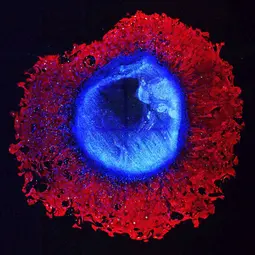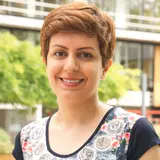Mechanisms Regulating Gene Expression
- Cell and Tumor Biology

Prof. Dr. Michaela Frye
Our division seeks to understand how RNA modification pathways regulate stem cell fate, and to explore whether modulation of RNA-modification pathways can help to protect from cancer.

Our Research
The decision of stem cells to self-renew, proliferate or undergo differentiation is initiated by external stimuli that are linked to an intrinsic network of transcriptional, post-transcriptional and translational processes. RNA plays versatile roles in the transcription and translation of genes into proteins. To expand the function of an RNA molecule and to increase its capacity to encode information, each nucleobase can be chemically modified. To date over 150 chemical modifications are known in RNA. Many RNA modifications are functionally indispensable for protein translation because they regulate messenger RNA stability and splicing as well as protein translation efficiency and accuracy.
One of the most common chemical RNA modification is methylation. Cytosine-5 RNA methylation for instance, is mediated by a large group of evolutionary conserved enzymes. The correct deposition of a methyl mark at cytosines is required for normal development and aberrant RNA methylation can lead to severe human diseases. Using a combination of novel transcriptome-wide quantitative analyses and well-established mouse and human in vitro and in vivo differentiation models, our group dissects the roles of RNA methyltransferases and their methylated target RNAs in normal development, human disease and cancer.
Ultimately, this division seeks to understand how RNA modification pathways regulate stem cell fate, and to explore whether modulation of RNA-modification pathways can help to protect from cancer.
Team
- Show profile

Prof. Dr. Michaela Frye
- Show profile

Dr. Mikaela Behm
- Show profile

Dr. Béatrice Berthet
- Show profile

Leona Brandl
-
Sabine Dietmann
- Show profile

Shafagh Heidari
-

Michael Kienhöfer
-
Sophia Isabelle Krappen
- Show profile

Dr. Cornelius Pauli
- Show profile
Enno Philipp
- Show profile
Tim Schmidt
- Show profile
Dr. Xinshui Tan
- Show profile

Dr. Sabrina Weser
- Show profile

Dr. Fu Xu
-
Bercin Yildiran
Selected Publications
Delaunay S., Pascual G., Feng B., Klann K., Behm M., Hotz-Wagenblatt A., Richter K., Zaoui K., Herpel E., Münch C., Dietmann S., Hess J., Benitah S.A., and Frye M
Selmi T, Hussain S, Dietmann S, Heiß M, Borland K, Flad S, Carter JM, Dennison R, Huang YL, Kellner S, Bornelöv S, Frye M
Blanco, S., Bandiera, R., Popis, M., Hussain, S., Lombard, P., Aleksic, J., Sajini, A., Tanna, H., Cortés-Garrido, R., Gkatza, N., Dietmann, S., and Frye, M
Get in touch with us

